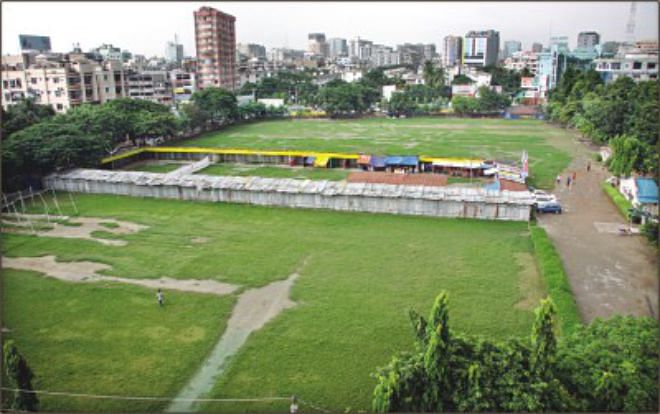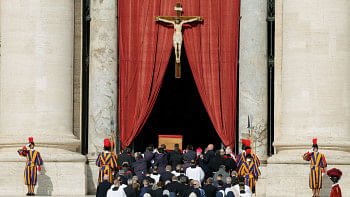Predatory elites and embattled citizens

THE residents of Dhanmondi residential area of Dhaka metropolis may be heaving a temporary sign of relief after the reclaiming of Dhanmondi playground for the public. While the Dhaka City Corporation has made it publicly clear that the ground is open for supposedly unfettered public use, one can also see the ongoing disputed construction work started by a private club. The ground reality being what it is now, nobody knows for sure if public interests would be effectively protected against the so-called elite interests.
The neo-elites of our society do not appear to realise the significance of social assets that mean a robust self-organising civil society deeply engaged with the everyday life of its communities. They also do not appreciate the value of our cultural assets as also the physical heritage, and the distinctiveness and vibrancy of its cultural life.
The club frequenters or the so-called elites have perhaps no eye for the environmental assets that includes those qualities of the physical environment that are essential for sustaining life itself; such as the air we breathe, the water we drink, and the capacity of the land to sustain permanent human settlement. The land grabbers do not want the city to be truly livable because they do not visualise any partnership with organised civil society.
To state the obvious, a vibrant society will invest in people, not only in hardware. A city needs to promote a form of social mobilisation that gathers public support because the outcomes will benefit the many, not merely a few. Private capital investments coupled with insensitive actors will lead to uneven or often grossly uneven access to basic human needs like health facilities, places of recreation and the possibility of good neighbourliness.
In Dhaka metropolis, in matters of urban planning, area-based approaches have been shown to benefit mainly the better off, thus not confronting the need for equity. In our case, as elsewhere, sustainable development must mean balancing the fulfillment of human needs with the protection of natural environment so that these needs can be met not only in the present but also in the indefinite future. In practical terms, this means meeting the needs of the present without compromising the ability of future generations to meet their own needs.
The Dhanmondi playground episode brings into sharp focus the issue of appropriate use of land that results in achieving health and hygiene. This objective is reached by providing social infrastructure like community centres, parks, and playgrounds and also keeping pollutants in different forms at their lowest possible scale. There has to be a proper connection between residential areas and community-oriented facilities. Mention must be made of the imperative of aesthetic development that may be achieved by taking as many advantages as possible of the natural conditions surrounding the township.
Our new elites need to know that ownership of civic work lies with citizens in the community. While a municipality must provide the general educational and funding support, only the direct involvement of citizens will achieve the requisite level of support necessary for a non-coercive, voluntary process of conflict resolution. Ownership and participation must mean a comprehensive system relating to all segments within an urban environment.
One could argue that conceptually, prevention is the work territory of the community. It is an area that is not full of regulations and certification requirements. It is not a terrain of professionals or professionalisation. The more citizens actively exercise their civic functions within the realm of prevention, the greater is the social cohesion within their community. In disorder and community-decline studies, the issue of civic participation and bonding is identified as an important factor in what determines whether a community can maintain forms of informal social control or not.
In fact, civic work and commonality of work interests serve as social bonds that are pervasive. In many respects where community ends, law and regulatory schemes begin. The more the need for formal law is lessened, the better it is for flowering of civic functions. In a democratic society, greater social cohesion and community harmony are manifest when actions that qualitatively improve the community are voluntarily undertaken by citizens.
It would not be unreasonable to argue that all prevention work falls within the ambit of civic rights associated with citizenship within a democratic society. The vitality and essentiality of civic exercise is a keystone to the success of the democratic experience. The exercising of the civic roles serves to enhance the foundations of the democratic system. Interestingly, the performance of these roles is inextricably linked to violence and disorder prevention.
Our new elites need to know that citizens have the unique capacity to intervene in conflicts before the state is constitutionally allowed to do so. The community interacts with problems as they emerge and try to resolve them quickly, before they enter the formal justice system. Good citizens surely would not like to leave public cause to escalate into the after-the-fact justice system thereby only producing testimonials to the unfortunate absence of preventive community system.
The writer is a columnist of The Daily Star.

 For all latest news, follow The Daily Star's Google News channel.
For all latest news, follow The Daily Star's Google News channel. 



Comments